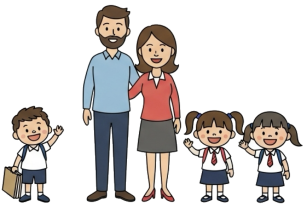
Question More, Action Knowledge.
Remember, at QMAK, we don’t just teach; we empower. We don’t just inform; we inspire. We don’t just question; we act. Become a Gold Member, and let’s unlock your child’s full potential, one question at a time.
Back to Mind Explorers
![]()
These games help children develop a greater awareness of their thought patterns and learn to direct their attention to the present moment. By practicing the skill of letting go of thoughts about the future and the past, children can cultivate a clearer and more focused state of mind.
Through these imaginative exercises, children learn that they have the power to observe and redirect their thoughts, rather than being entirely at their mercy. This realization can foster a sense of agency and self-regulation, as children discover that they can influence their mental experiences through conscious effort and play.
Moreover, by emphasizing the value of present-moment awareness, these games can help children develop a more grounded and resilient approach to life’s challenges. By learning to anchor themselves in the here and now, children can find a sense of stability and ease amidst the constant flux of thoughts and emotions.
Hey there, young time traveler!
Today, we're going to play three fun games called "Think About Anything You Want Except the Past and the Future," "Future Fishing," and "Past Catching."
These games will help us explore our thoughts and learn how to focus our minds on the present moment.
We'll be using our imagination to catch thoughts about the future and the past, leaving us with a clearer mind.
Are you ready to embark on this exciting mental adventure?
Game 1: Think About Anything You Want Except the Past and the Future

Game 2: Future Fishing

Game 3: Past Catching

To further explore the concept of present-moment awareness and the power of mindfulness, consider introducing your child to the book “The Mindful Dragon: A Dragon Book about Mindfulness” by Steve Herman.
This enchanting story follows the adventures of a young dragon named Diggory, who learns the secrets of mindfulness from a wise old dragon. Through a series of whimsical challenges and delightful encounters, Diggory discovers how to tame his fiery temper, calm his racing thoughts, and find peace and contentment in the present moment.
1. Who is the main character of the book?
a) A knight
b) A princess
c) A dragon
d) A wizard
2. What problem does the dragon have at the beginning of the story?
a) Can’t breathe fire
b) Feels stressed and overwhelmed
c) Can’t fly
d) Has no friends
3. Who teaches the dragon about mindfulness?
a) Another dragon
b) A wise owl
c) His parents
d) A human child
4. What is one of the first mindfulness techniques the dragon learns?
a) Deep breathing
b) Running fast
c) Sleeping all day
d) Eating lots of food
5. How does the dragon practice being present in the moment?
a) By thinking about the future
b) By worrying about the past
c) By focusing on his senses
d) By ignoring everything around him
6. What does the dragon learn about his thoughts?
a) To always believe them
b) To ignore them completely
c) To observe them without judgment
d) To only have happy thoughts
7. How does mindfulness help the dragon?
a) It makes him bigger and stronger
b) It helps him feel calmer and more focused
c) It gives him magical powers
d) It makes him invisible
8. What does the dragon learn about difficult emotions?
a) To avoid them at all costs
b) To express them by breathing fire
c) To acknowledge and accept them
d) To pretend they don’t exist
9. How does the dragon’s behavior change after practicing mindfulness?
a) He becomes more aggressive
b) He sleeps all the time
c) He becomes kinder and more patient
d) He stops interacting with others
10. What is the main message of the book?
a) Dragons are the best at mindfulness
b) Mindfulness is only for magical creatures
c) Mindfulness can help manage stress and emotions
d) Mindfulness is too difficult for children
1. c) A dragon
2. b) Feels stressed and overwhelmed
3. c) His parents
4. a) Deep breathing
5. c) By focusing on his senses
6. c) To observe them without judgment
7. b) It helps him feel calmer and more focused
8. c) To acknowledge and accept them
9. c) He becomes kinder and more patient
10. c) Mindfulness can help manage stress and emotions
Verse 1:
Thoughts like fish in a stream
Past and future, they all teem
But here’s a game we can try
Catch those thoughts as they swim by
Pre-Chorus:
Not yesterday, not tomorrow
Just this moment, let’s follow
Chorus:
Now is where we play
Fishing thoughts away
Past and future in a box
Present moment rocks
Verse 2:
On a lake of memories
Catch the past with gentle ease
Future dreams on hooks we’ll find
Clear the waters of our mind
(Pre-Chorus)
(Chorus)
Bridge:
What’s left when time stands still?
A world of wonder to fulfill
In this moment, fresh and new
Endless possibilities come true
(Chorus)
Outro:
Open your eyes to this magic space
Where now is the only place
In this game of mind and time
We find the present so sublime

Remember, at QMAK, we don’t just teach; we empower. We don’t just inform; we inspire. We don’t just question; we act. Become a Gold Member, and let’s unlock your child’s full potential, one question at a time.